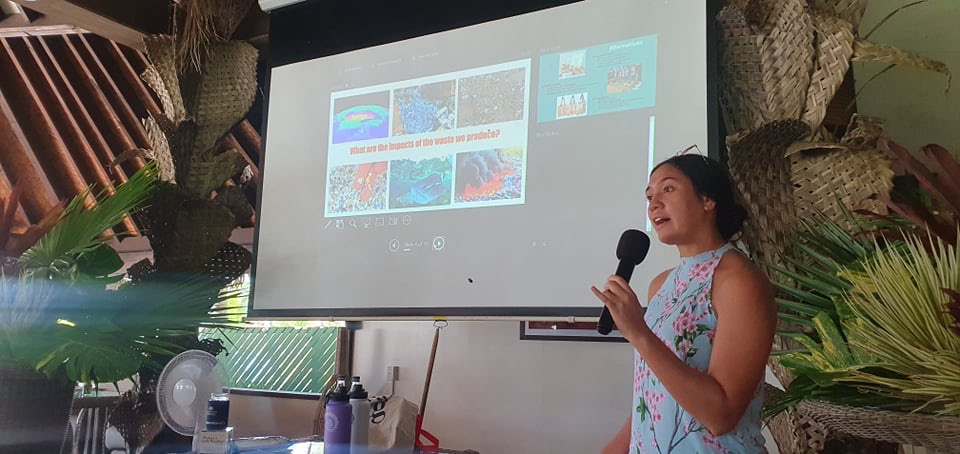E Tu’a Pukuruvaa Nui – Sharing ideas amongst one another
Saturday 11 February 2023 | Written by Te Ipukarea Society | Published in Environment, Local, National, Outer Islands

Save the environment of tomorrow by saving your money today. TIS/23021002
A two-day tourism conference was held at Tamanu Beach Resort on Tuesday and Wednesday this past week. Participants included tour operators, accommodators, retailers, Members of Parliament, Aronga Mana reps and the mayor and island council representatives of Aitutaki.
A mixture of presenters and interactive workshop discussions with stakeholders from the Cook Islands provided the opportunity to increase awareness of existing tourism industry plans, identify development paths for local businesses and accommodations on Aitutaki and come up with local solutions.
The E Tu’a Pukuruvaa Nui conference was important because it highlights how different tourism operated business owners and workers can operate a business without having a significant negative impact on the economic, environmental and social platforms of tourism. It allows for the participants of the event to interact and possibly come up with ideas that may help each other.
With support from Cook Islands Tourism, Tamanu Beach Resort and Air Rarotonga,Te Ipukarea Society were asked to participate and present at the two-day workshop to raise awareness about environmentally friendly business practices. Some of these environmentally friendly plans include self-regulation such as buying in bulk, composting, and upcycling materials that you already have into something new.
A presentation by Sieni Tiraa, Sustainable Tourism Manager from Cook Islands Tourism Corporation,highlighted Cook Islands Tourism’s newest vision for the Cook Islands: Regenerative Tourism. This is inspired by the concept of “Leaving a place better than how you found it”, and is uplifted by the pillars of: Commerce - ensure that our local economy are benefitting from this, Community – ensuring that our local community are not competing with tourists and each other for resources, Conservation – ensuring that the natural environment is not harmed by your operation, and Culture – ensure that your operation does not provoke or offend the cultural customs of the Cook Islands.
“Our presentation highlighted the reasons for why it is important for us to reduce the amount of single use plastics that we purchase and provide alternative solutions such as biodegradable, refillable, and reusable options.”
Our presentation highlighted the reasons for why it is important for us to reduce the amount of single use plastics that we purchase and provide alternative solutions such as biodegradable, refillable, and reusable options. After our presentation had concluded, groups had the opportunity to discuss what they had heard. They concluded that moving in the green direction does have some challenges. For instance, the biggest concern for most of the businesses was the accessibility of purchasing eco-friendly products as well as the additional cost of shipping them to Aitutaki. There is also the issue of Aitutaki’s poor waste management. Although the waste materials from local businesses and accommodations are separated into different bins, there is only one area of ‘disposal’ in which they all end up.
Furthermore, Aitutaki struggles with keeping the young members of the community from leaving after they have graduated from school. This makes the passing of ideas and orchestration of current visions for the future, a challenge to achieve. This is made worse by the lack of teachers qualified in certain subjects, resulting in students from the local school flying out of island to gain an education, with many students not returning.
Possible solutions discussed for this issue was to have more internships and job opportunities available for youth. This can be as simple as having holiday programmes or internships so that the youth can build up their experience in the workplace. The main goal is to have this result in Aitutakian children developing interest in maintaining this area of tourism.
The appeal of Aitutaki is hard to deny with its aqua blue lagoon, unique snorkelling experiences and a honeymooner’s dream destination. While this is what successful tourism may look like to the residential Aitutakian, local business owners and accommodations, we need to focus our attention on eco-friendly business practices such as improving on waste management, upcycling and purchasing in bulk. By prioritising these concepts, we can maintain our reputation as the ‘hidden gem of the South Pacific’.














































